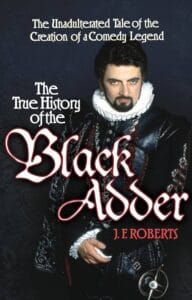This is part 1 of a series of posts publishing my Undergraduate dissertation titled An examination of superiority theory and power relations within the British sitcom Blackadder.
See the full series here.
This dissertation will explore the role of superiority theory and power relations within the British situational comedy, Blackadder (The Blackadder, Lloyd, 1982-1983; Blackadder II, Lloyd, 1986; Blackadder the Third, Lloyd, 1987; Blackadder Goes Forth, Lloyd, 1989). I have chosen this theme because, as a fan of “classic” British situational comedy such as Fawlty Towers (Davis & Argent, 1975-1979), Only Fools and Horses (Sullivan, 1981-2003), Blackadder and Red Dwarf (Jackson et al., 1988-2020), I was interested to explore the comedy form and how comedy theory applies. I chose Blackadder due to the changing historical setting between series and the interesting relation to social class inasmuch as Blackadder seems to be in a constant battle to move between social classes through the acquisition of power.

Richard Curtis and Rowan Atkinson met at the Cambridge Footlights show and worked together on Not the Nine O’Clock News (Lloyd & Hardie, 1979-1982). They were planning a new series when the idea for Blackadder came after watching The Adventures of Robin Hood (Curtiz & Keighley, 1938). J. F. Roberts noted in their 2013 book The True History of the Black Adder “If it was murder and skulduggery they wanted, after years of topical sketches, what would be a cleaner break than a medieval tights-and-codpiece spoof”? (p. 81).
Blackadder is historically set and draws upon an audience’s basic understanding and assumptions of the historical period being portrayed. (The Blackadder, Medieval period; Blackadder II, Elizabethan; Blackadder the Third, Regency; Blackadder Goes Forth, World War I). An audience may know of the earlier periods, especially due to the popularity of costume dramas, but connections to historical figures are difficult to form until Goes Forth, which is set within living, modern history. Even then, the historical figure of General Haig is only seen within the final moments of the final episode, which I believe was a deliberate move by the creators due to the contentious character and with it being within living history. The earlier series are glamorous in set design and costume, however, moving into Goes Forth, this changes and a stark contrast between the trenches and General Melchett’s chateau is formed, which we will explore in relation to social class and hierarchy.

Chapter 1 will set up the core idea of power through joke telling and we will see if this applies to characters within Blackadder, whilst Chapter 2 will change the focus to the structures of sitcom and physical and textual awareness to argue its importance within the studio and situational comedy environment and how class is portrayed through such an awareness. We will take the findings from the aforementioned chapters and apply them to a focused case study in Chapter 3 where we will look at the construction and reception of Blackadder Goes Forth, with a particular emphasis on the final episode “Goodbyeee” (Curtis, Elton & Boden, 1989d).
- Badsey, S. (2001). Blackadder Goes Forth and the ‘Two western fronts’ debate. In G. Roberts & P. M. Taylor (Eds.), The Historian, Television and Television History (pp. 113-125). University of Luton Press.
- Bardon, A. (2005). The Philosophy of Humor. In M. Charney (Ed.), Comedy: A Geographic and Historical Guide. (pp. 462-476). Connecticut: Greenwood Press.
- Bettinson, H. (Writer). (1996). Haig: The Unknown Soldier [Documentary]. British Broadcasting Corporation (BBC).
- British Comedy Guide (2004). Top 50 British TV sitcoms. https://www.comedy.co.uk/tv/top/
- Croft, D. (Producer). (1968-1977). Dad’s Army [TV series]. British Broadcasting Corporation (BBC).
- Curtis, R., Elton, B. (Writers) & Boden, R. (Director). (1989, November 2). Goodbyeee (Episode 6) [TV series episode]. In J. Lloyd (Producer), Blackadder Goes Forth. British Broadcasting Corporation (BBC).
- Curtiz, M. & Keighley, W. (Directors). (1938). The Adventures of Robin Hood [Film]. Warner Bros.
- Davies, J. H., & Argent, D. (Producers). (1975-1979). Fawlty Towers [TV series]. British Broadcasting Corporation (BBC).
- Groves, J. (2014, January 4). History dons back Gove over ban on Blackadder: Great War comedy is not a documentary for schools, they argue. Mail Online. https://www.dailymail.co.uk/news/article-2533619/History-dons-Gove-ban-Blackadder-Great-War-comedy-not-documentary-schools-argue.html
- Hyde, E. (2023, January 1). 10 Best British Sitcoms. GameRant. https://gamerant.com/best-british-sitcoms/
- Jackson, P. (Producer). (1982-1984). The Young Ones [TV series]. British Broadcasting Corporation (BBC).
- Jackson, P., Naylor, D., Grant, R., Normal, H., & Langan, C. (Executive Producers). (1988-2020). Red Dwarf [TV series]. Grant Naylor Productions; Baby Cow Productions; British Broadcasting Corporation (BBC).
- [J. F. Robert’s The True History of the Black Adder, 2013]. (n.d.). Retrieved 6 March 2025, from https://images.app.goo.gl/fagtFTGGUZjKk2Fa7
- [John Morreall’s Taking Laughter Seriously, 1983] (n.d.). Retrieved 6 March 2025, from https://images.app.goo.gl/nACoNfdXjC1a9AQd6
- Lloyd, J. (Producer). (1982-1983). The Black Adder [TV Series]. British Broadcasting Corporation (BBC).
- Lloyd, J. (Producer). (1986). Blackadder II [TV Series]. British Broadcasting Corporation (BBC).
- Lloyd, J. (Producer). (1987). Blackadder the Third [TV Series]. British Broadcasting Corporation (BBC).
- Lloyd, J. (Producer). (1989). Blackadder Goes Forth [TV Series]. British Broadcasting Corporation (BBC).
- Lloyd, J., & Hardie, S. (Producers). (1979-1982). Not the Nine O’Clock News [TV series]. British Broadcasting Corporation (BBC).
- Lotterby, S. (Producer). (1974-1977). Porridge [TV series]. British Broadcasting Corporation (BBC).
- Morreall, J. (1983). Taking Laughter Seriously. State University of New York Press.
- Roberts, J. F. (2013). The True History of the Black Adder. Arrow Books.
- Sullivan, J. (Executive Producer). (1981-2003). Only Fools and Horses. British Broadcasting Corporation (BBC).
- [The Black Adder DVD Art]. (n.d.). Retrieved 28 February 2025, from https://www.imdb.com/title/tt0084988/mediaviewer/rm3982335488
- Wagg, S. (1998). ‘AT EASE CORPORAL’ Social class and the situation comedy in British television, from the 1950s to the 1990s. In S. Wagg (Ed.), Because I tell a Joke or Two. (pp. 1-31). Routledge.
APA7
Cable, J. (2025, May 05). Contextualizing Blackadder and introducing the research. JCableMedia.com. https://www.jcablemedia.com/2025/05/05/contextualizing-blackadder-and-introducing-the-research/.
Chicago
Cable, John. “Contextualizing Blackadder and introducing the research.” JCableMedia.com. May 05, 2025. https://www.jcablemedia.com/2025/05/05/contextualizing-blackadder-and-introducing-the-research/.
Harvard
Cable, J. (2025). Contextualizing Blackadder and introducing the research. Available at: https://www.jcablemedia.com/2025/05/05/contextualizing-blackadder-and-introducing-the-research/ (Accessed: 07 August 2025).